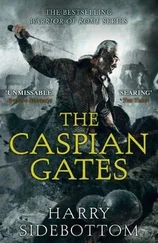Harry Sidebottom - The Wolves of the North
Здесь есть возможность читать онлайн «Harry Sidebottom - The Wolves of the North» весь текст электронной книги совершенно бесплатно (целиком полную версию без сокращений). В некоторых случаях можно слушать аудио, скачать через торрент в формате fb2 и присутствует краткое содержание. Жанр: Исторические приключения, на английском языке. Описание произведения, (предисловие) а так же отзывы посетителей доступны на портале библиотеки ЛибКат.
- Название:The Wolves of the North
- Автор:
- Жанр:
- Год:неизвестен
- ISBN:нет данных
- Рейтинг книги:3 / 5. Голосов: 1
-
Избранное:Добавить в избранное
- Отзывы:
-
Ваша оценка:
- 60
- 1
- 2
- 3
- 4
- 5
The Wolves of the North: краткое содержание, описание и аннотация
Предлагаем к чтению аннотацию, описание, краткое содержание или предисловие (зависит от того, что написал сам автор книги «The Wolves of the North»). Если вы не нашли необходимую информацию о книге — напишите в комментариях, мы постараемся отыскать её.
The Wolves of the North — читать онлайн бесплатно полную книгу (весь текст) целиком
Ниже представлен текст книги, разбитый по страницам. Система сохранения места последней прочитанной страницы, позволяет с удобством читать онлайн бесплатно книгу «The Wolves of the North», без необходимости каждый раз заново искать на чём Вы остановились. Поставьте закладку, и сможете в любой момент перейти на страницу, на которой закончили чтение.
Интервал:
Закладка:
Being quartered in one of the few houses that still had a working hypocaust had been a saviour. Without the hot air circulating under the floor, Hippothous was convinced he would have died of cold.
‘After streaming through the Bosporus, the great shoals follow the sun around the Euxine. By Trapezus, they have enough size to be just worth catching.’
Hippothous knew they did not have to be here. The ancients had vastly overestimated the size of Maeotis. They could have sailed from Panticapaeum to the mouth of the Tanais in a long day, especially with the wind set from the south-east. But in Panticapaeum both the king and his navarchos had insisted, almost pleaded, they break their journey twice; first here with the Tarpeites, and then with the Psessoi. Long ago, the kings of the Bosporus had ruled these tribes of Maeotae with a secure grasp, their control guaranteed by the might of Rome. Now Rhescuporis V, descendant of Heracles, of the line of Poseidon through his son Eumolpos, hoped the rare sight of a single imperial trireme and a handful of regular soldiers in company with one of his very few remaining little liburnians might give his claims to local hegemony just a mite of credibility.
In Alexandria, Hippothous had once heard a philosopher from the Museum lecturing on power and force. His argument was that they were distinct. Force consumed itself with the deployment of armed men. On the other hand, power was the result of the complex, possibly intangible, calculations the subordinate made concerning the consequences of disobeying instructions. As such, power might last for ever. Sat in this fish-reeking hall, Hippothous knew the philosopher was wrong. With the legions tasting defeat at barbarian hands — the emperor Decius cut down by the Goths, Valerian a prisoner of the Persians — or trapped in endless civil wars, Rome’s power was wearing threadbare, the edges of its imperium fraying loose.
‘Now, when they pass by Sinope, they are altogether riper for catching and salting.’
Hippothous liked fish as much as the next man. The black, salty fish roe he was spooning on his bread — he did not think it had a Greek name — might be poor man’s food, but it was good. However, this verbal tracking of tunny from watery cradle to grave was becoming intolerable. He looked around for distraction.
Practising the science of physiognomy did more than assuage boredom. If you got it right, it told you the true nature of those around you, gave you access to their souls. Ultimately, it allowed you to guard against the vices of the bad before you had to experience them. Hippothous let his gaze slide over the body servant Calgacus and the bodyguard Maximus, one too ugly, the other too scarred for clear results; maybe one day he would try to analyse them. The locals were too encased in filth. He suppressed a shudder at the sight of the two eunuchs.
He settled on Castricius. Hippothous had studied the little officer before but, then, his perceptions had been blunted by a raging hangover. Confronted by a grave issue, the Persians discussed it once sober, a second time drunk. Hippothous would revisit the soul of Castricius.
The little officer was seated opposite. He was talking to a young Tarpeites warrior who would have been attractive if he had not been so disgustingly dirty. Their conversation was animated. Hippothous could observe Castricius with little fear of detection. He no longer cared if his voluble and fish-obsessed neighbour thought him rude.
Hippothous stared at Castricius, emptied his mind, let his training take over. There were good aspects to the man: his protruding lower lip pointed to tenderness, and a love of well being. But the bad far outweighed the good. There was his sharp little nose, thin at the tip. It indicated a great anger. Then there was the short, angular chin, a sure sign of boldness, badness and killing, even entering into evil. Castricius had unexpectedly beautiful eyes. Nothing redeeming about that. Eyes were the gateway to the soul, and beautiful eyes concealed what was there, gave proof of treachery. All the evidence scientifically weighed, Hippothous was as convinced as before that Castricius was a bad man, a bad and very dangerous man.
A burst of loud, unseemly laughter from the head of the hall. It was the king. He was leaning across, roaring at Ballista, patting his leg. The king was drunk. Hippothous considered it unlikely Ballista was having a better time than himself. The big northerner’s face was set in an inscrutable mask of polite attention. In the three years he had served Ballista, despite repeated study, Hippothous had yet to reach a definitive conclusion. All the signs had to be considered, and they led to different, mutually incompatible results. The Hellenized barbarian was a complicated subject. His eyes were heavy-lidded, sloping towards the corners. The master physiognomist Polemon judged that this revealed a man contemplating evil. Yet the eyes were dark blue, almost bluish black, and they shone, sometimes like the rays of the sun. Such belonged to a man of compassion and caution, the latter maybe going as far as cowardice and fear.
The king was still laughing. Hippothous watched Ballista sigh and look down at his food. Certainly the big man had reason for melancholy. Ripped from his original home in Germania, he was now also banished from Rome and from Sicily, from his wife and sons — for whom he showed a striking tenderness. Anyone could see this mission was a dangerous fool’s errand — the sort landed on the very expendable. And there was the curse. The previous year in the Caucasus, Ballista had taken as a lover a princess of the royal house of Suania, a priestess of the bitch goddess Hecate. It had not ended well. As they left, Pythonissa — a modern Medea — had called up from the underworld the most terrible curse on Ballista:
Kill his wife. Kill his sons. Kill all his family, all those he loves. But do not kill him. Let him live — in poverty, in impotence, loneliness and fear. Let him wander the face of the earth, through strange towns, among strange peoples, always in exile, homeless and hated.
Hippothous thought Ballista might well cast his eyes down and sigh.
II
The trireme had rounded Pataroue point some hours before. They were now not far out from Tanais. The two tribes of the Maeotae — the Tarpeites and the Psessoi — they had been forced to visit were behind them, safely negotiated. It had taken three days. Now the Gothic people of the Urugundi lay ahead, and beyond them the endless expanse of grasslands and the Heruli.
The wind had dropped to a dead calm. The 170 rowers were earning their stipendium as they drove the vessel through the thick, oddly opaque water. The triple banks of oars rose and fell like the wings of some labouring waterfowl, never destined to fly. As the blades came free they were festooned with all manner of weeds.
Ballista inhaled the comfortingly familiar smells of a war-galley: the sun-warmed wood and pitch of the decking and hull, the mutton fat and leather of the oar sleeves, the stale sweat and urine of the crew. He was seated in a chair behind the helmsman, towards the stern. He would have been as happy to sit on the planking, but the majesty of Rome demanded a certain dignitas. Likewise, her never-to-be-denied maiestas insisted her envoy be accompanied by a suitably dignified entourage. Ballista looked down the long deck at them. There was his deputy, Castricius. There was his familia: Maximus, Calgacus and Hippothous, and the Suanian Tarchon, who had attached himself to them the previous year in the Caucasus. There also were his young slave, Wulfstan, and the two slaves owned by Castricius and Hippothous. Apart from the familia there was his escort sent up from Byzantium: Hordeonius the centurion and his ten men seconded from Cohors I Cilicium Milliaria Equitata Sagittariorum by the governor of Moesia Inferior. And then there was the official staff: the eunuch freedmen Mastabates and Amantius, the interpreter Biomasos, the herald Regulus, two scribes, two messengers, and Porsenna the haruspex to read the omens. Six more slaves, variously owned, brought the number of souls to thirty-five.
Читать дальшеИнтервал:
Закладка:
Похожие книги на «The Wolves of the North»
Представляем Вашему вниманию похожие книги на «The Wolves of the North» списком для выбора. Мы отобрали схожую по названию и смыслу литературу в надежде предоставить читателям больше вариантов отыскать новые, интересные, ещё непрочитанные произведения.
Обсуждение, отзывы о книге «The Wolves of the North» и просто собственные мнения читателей. Оставьте ваши комментарии, напишите, что Вы думаете о произведении, его смысле или главных героях. Укажите что конкретно понравилось, а что нет, и почему Вы так считаете.












